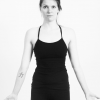Sthira sukham asanam.
Patanjali’s sutra 2.46.
The balancing of steadiness—sthira—and ease—sukha.
Whether seated in a simple cross-legged posture or balancing on your hands with one leg wrapped around the back of your head in eka pada sirsasana, this sutra is a reminder to tread the space between effort and effortlessness.
Sthira teaches us to use muscular strength to hold the body upright (right side up or upside down). Sukha teaches us to avoid forcefulness, to move away from postures that cause pain, to seek to decrease patterns of tension in the body rather than reinforcing them.
Sthira was the first goal of my practice; I was athletic when I began my love affair with yoga, but I wasn’t particularly strong. I was flexible enough to find juicy hip openers and radiant backbends, but I lacked stability in many of those postures.
Slowly, over the course of a several years, I became a warrior. I learned to hug in from my core to support the length of my spine. I turned my legs into tree trunks. I turned my arms into wings.
And then I got comfortable. I let it stay easy.
I veered away from poses that required a leap of faith, from poses where I might be confronted with the uncomfortable reality of falling. Urdvha danurasana—”upward bow pose,” or wheel—was a big one. Not the pose itself—I could float up from the floor without difficulty, I could lean back and walk my hands down a wall into its graceful arc—but I couldn’t take the next fearful step: I couldn’t drop back into it from tadasana {mountain pose).
A few weeks ago, under the guidance of a gifted teacher (one who saw that I had the sthira and a little too much sukha) I finally let myself fall. And surprised myself by landing steadily, easefully on my hands. Drop backs are now something I can do—they’ve even quickly become something I do comfortably.
So I’d like to propose a slight editing of 2.46; something that gets rid of the word easy. How about: the balancing of steadiness and sheer terror (Sanskrit for that, anyone?).
“Open your hands if you want to be held,” Rumi wrote. “Move outside the tangle of fear thinking…flow down and down in always widening rings of being.”
Flow down. Fall. Fall into urdvha dhanurasana. Fall out of handstand. Fall in love. Fall out of line. Get bruised, get embarrassed, get lost. Reach for the moon, fall back to earth. Learn how to fail, and how to let go.
Fall out of your ego, your self-conscious skin.
In the practice of yoga, in the practice of life, we pose at the edge of the diving board that reaches its thin arm over the lake of untried experience. And we dive. It is in knowing how to dive that we find sukha.
Ease.
The act of holding yourself steadily in gravity’s embrace, the moment of flight before you take your next plunge.
Like on elephant yoga on Facebook.
Asst. Editor: Edith Lazenby/Ed: Bryonie Wise
Ready to join?
Hey, thanks so much for reading! Elephant offers 1 article every month for free.
If you want more, grab a subscription for unlimited reads for $5/year (normally, it's $108/year, and the discount ends soon).
And clearly you appreciate mindfulness with a sense of humor and integrity! Why not join the Elephant community, become an Elephriend?
Your investment will help Elephant Journal invest in our editors and writers who promote your values to create the change you want to see in your world!
Already have an account? Log in.
Ready to join?
Hey, thanks so much for reading! Elephant offers 1 article every month for free.
If you want more, grab a subscription for unlimited reads for $5/year (normally, it's $108/year, and the discount ends soon).
And clearly you appreciate mindfulness with a sense of humor and integrity! Why not join the Elephant community, become an Elephriend?
Your investment will help Elephant Journal invest in our editors and writers who promote your values to create the change you want to see in your world!
Already have an account? Log in.
Ready to join?
Hey, thanks so much for reading! Elephant offers 1 article every month for free.
If you want more, grab a subscription for unlimited reads for $5/year (normally, it's $108/year, and the discount ends soon).
And clearly you appreciate mindfulness with a sense of humor and integrity! Why not join the Elephant community, become an Elephriend?
Your investment will help Elephant Journal invest in our editors and writers who promote your values to create the change you want to see in your world!
Already have an account? Log in.
 Share on bsky
Share on bsky




Read 0 comments and reply